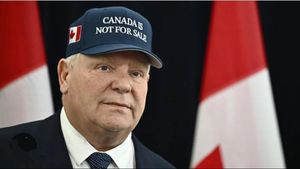Former President Donald Trump has thrown the spotlight back onto South Africa's contentious land policies, announcing plans to cut off all future U.S. funding to the nation until what he demands is a complete and thorough investigation is conducted.
On social media platform Truth Social, Trump expressed his concerns about the state of land ownership and treatment of individuals in South Africa, stating, "South Africa is confiscATING land and treating certain classes of people VERY BADLY." He continued, urging action from the U.S. government, declaring, "The United States won't stand for it, we will act. Also, I will be cutting off all future funding to South Africa until a full investigation of this situation has been completed!" Such funding amounts to nearly $440 million for 2023, primarily supporting health initiatives like HIV/AIDS programs, according to recent U.S. government data.
This incendiary announcement follows South African President Cyril Ramaphosa's signing of the Expropriation Act, which allows for land expropriation without compensation under specific conditions, including instances where the property is deemed unused. The law aims to tackle the racial disparities rooted deeply in the injustices of colonial rule and the era of apartheid, which left vast differences in land ownership across racial lines. Ramaphosa defended the law, asserting it ensures equitable access to land. He addressed Trump's claims directly, emphasizing, "The recently adopted Expropriation Act is not a confiscation instrument, but a constitutionally mandated legal process..."
Trump's remarks have drawn ire and criticism from several quarters, not least from Ramaphosa himself, who emphasized South Africa's right to enact their policies. He stated, "We look forward to engaging with the Trump administration over our land reform policy and issues of bilateral interest." Ramaphosa indicated his willingness to discuss these sensitive topics, framing the conversation around the need to readdress historical injustices through legal means.
The issue is compounded by the increasing presence of Elon Musk, the South African-born billionaire and tech mogul, who previously championed right-wing views and remains closely associated with Trump. Responding to Ramaphosa's statement, Musk took to X, rudely questioning South Africa's laws on land ownership: "Why do you have openly racist ownership laws?" His commentary stirs the pot, particularly as it touches upon the emotional narratives surrounding race and land ownership, legacy issues the country still grapples with.
Ramaphosa's spokesperson, Vincent Magwenya, invited Musk for constructive dialogue, reiteratively reminding him of the historical injustices South Africa faces due to colonialism and apartheid. Addressing Musk, Magwenya noted, "You would know... our constitution provides for redressing the ills of the past." This acknowledgment of South Africa's brutal history frames the land issue within broader societal shifts toward equality and justice.
The clash between Trump and South Africa is not merely limited to land disputes but encapsulates decades of rapidly deteriorated relations—stirred lately by South Africa's perceived alignment with Russia amid its invasion of Ukraine, decisively alienated the U.S. administration. Analysts note the Biden administration was already displeased with South Africa’s joint naval drills with Russia and China, continuing to fuel underlying tensions surrounding U.S. foreign policy toward the region.
On the markets, news of Trump's punitive remarks hit South Africa hard, with the rand falling approximately 2% against the U.S. dollar shortly after the announcements. Emerging-market currencies found themselves under pressure, undermined not only by Trump's statements but also by his broader tariff measures impacting nations like China and Mexico. Economists expressed concern about the ramifications Trump's potential return to the White House could have on South Africa's investment appeal.
Trump's rhetoric and subsequent economic threats are indicative of his more aggressive approach, as he rarely holds back on social media or public platforms. Commentators suggest South Africa may struggle under the looming shadow of potential trade sanctions or loss of U.S. aid—a significant concern for Ramaphosa, who seeks to stabilize the South African economy amid rising unemployment and foreign disinvestment.
Historically, South African governments have faced various challenges when addressing land ownership—a topic charged with emotion and political ramifications. The current administration is tasked with assuring both local and international audiences about the long-term sustainability of land reform initiatives. The Expropriation Act signifies South Africa’s commitment to righting the injustices of the past through legal means, which could lead to more significant diplomatic discussions with the U.S., should Trump's warning translate to action.
Reflecting on the increasing pertinence of global responses to domestic policy issues, analysts like Ronak Gopaldas of Signal Risk are emphasizing the importance of how South Africa navigates the intense pressure from the U.S. "The game has changed, and we are now in an era of personality politics. Optics, messaging, and PR matter," he affirms, indicating the necessity for diplomatic finesse.
While Trump's comments amplified existing tensions, they have also stirred debate among South Africans and international observers alike over the optimum approaches to addressing land reform without exacerbation of existing racial and economic divides. The path forward hinges significantly on constructive dialogue between leading figures on both ends, perhaps paving the way for cooperation rather than conflict.



